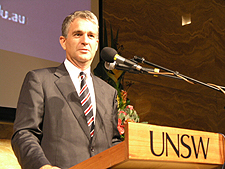
Former Deputy Prime Minister John Anderson has told a forum on faith and politics that the State cannot survive without the Church and has urged church members to interact with politicians relationally.
Mr Anderson used Archbishop of Sydney Dr Peter Jensen's recent comments that the Industrial Relations Reform downplays the value of relationships among Australians, as a positive example of how Christians should relate to politicians.
"The Archbishop has earned the right to be heard with respect even by those who do not share his beliefs," said Mr Anderson, a committed Christian, who stepped down from the front bench in June.
The forum was the annual lecture series at New College, an Anglican residential college at the University of New South Wales.
The lecture on Tuesday night was titled "Faith in Politics: Resolving the Church and State Debate'.
Mr Anderson challenged Christians to recognise that because the gospel values relationships, church members need to interact with politicians as humans " by earning their trust and respect.
"That God, and the gospel, are relational, suggests that relationship must also be at the heart of how Christians go about interacting with the State."
The forum on Tuesday, which played host to more than 400 guests, mapped the contours of the separation of Church and State " what Australians mean by it, why the nation has it, what its uses are and its modes of public discourse.
Mr Anderson said the Church has proved unable to resist the temptation to "Christianise' society by enforcing outward behavioural standards, arguing this often takes precedence over meeting the harder but much more biblical challenge of winning hearts and souls.
He said Protestant Christianity has played an important role in caring for the poor and disadvantaged, noting that almost all aid organisations were and are of a religious origin or character.
"But my belief in the formal separation of Church and State does not mean that I see it as either legitimate or wise to try and force the voice of Christianity out of the public square," he said.
"It is very much my view that Church and State should be institutionally separated in the interest of both" I think that our forefathers got it about right in the Australian Constitution.
"Since then, in our own very pragmatically and sensible Australian way, we've evolved a pretty good balance between the two."
Mr Anderson said he disagrees with the views of some politicians that Christians should leave their beliefs outside when they walk into the cabinet room.
"I was never able to see how it would be possible, let alone wise, to do so", he said.
"Logically, the presence of a worldview through which any individual addresses and understands the world is inevitable."
In his speech, the MP proposed that the Church must have a distinct worldview that allows it to contribute thoughtfully and theologically to public life.
He held that it should be a worldview that understands the State as temporary, contributes widely and has relationships as central.
"For Christians to fail in this area would neglect the State to which we have a responsibility," he said.
On the Church side of the debate was Moore Theological College lecturer the Rev Dr Andrew Cameron. He investigated the origins of the "wall of separation' of Church and State, and showed why Christian theology is deeply in favour of it.
"The "Church and State' discussion is too often an angry and half-baked quarrel that takes place on the run, whenever a church leader comments on some government initiative, or whenever a Christian politician alludes to his or her faith," said Dr Cameron.
In light of intelligent debate, both speakers called for an institutionally distinct but more active approach to the relationship between church and state.
Keely Edwards
Photo by Hendry Wan
Mr Anderson’s address was delivered as part of the 2005 New College Lecture Series on Church and State. New College is the Anglican Residential College at the University of NSW in Kensington. Visit the College website where you can download printable PDF transcripts of the 2005 New College Lectures.






















